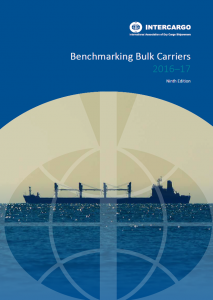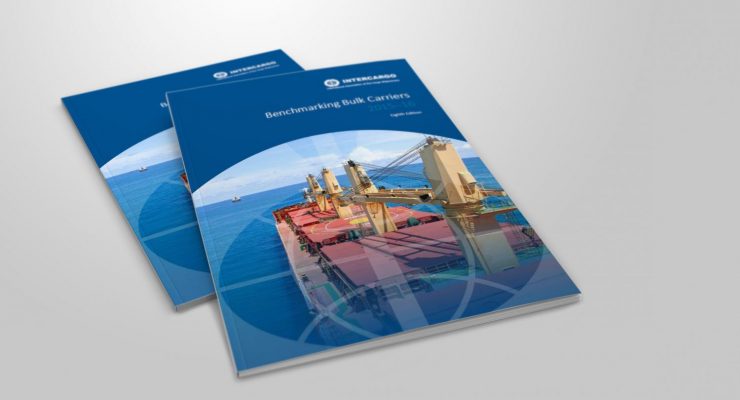The INTERCARGO Benchmarking Bulk Carriers 2016-17 report has been published. Members will be receiving their free copy. Non-members may order the report at info@intercargo.org or from Witherby Publishing Group (www.witherbys.com).
 EXECUTIVE SUMMARY
EXECUTIVE SUMMARY
INTERCARGO’s 2016–2017 Benchmarking Report is published at a time of market improvement and positive sentiment following the challenging times for dry cargo shipowners, that we were commenting on a year ago. In 2017, the dry bulk market recorded a solid improvement to the previous year with the Baltic Dry Index clearly strengthening and going above the 1,700 points in December, after the historic low below 300 points it experienced in early 2016. The global capacity of the fleet hardly grew in 2016 and low newbuilding activity assisted the supply/demand balance of the market in 2017. Moreover, through to 2018, the demand growth for dry bulk shipping capacity has a positive momentum, moving ahead of supply expansion. After all, asset values and charter rates, and in the end earnings, have experienced improvement for dry cargo shipowners.
While the commercial context has been changing to positive territory, at the same time regulatory requirements have been progressing at an equally rapid pace as in the previous year. INTERCARGO’s three reference pillars are safety, efficiency, and the environment, with our aims always being ”quality & operational excellence”. The present report is focused for one more year on these priorities.
With safety for crews and ships coming first, casualties in 2017 were marked by the tragic losses of M/V Stellar Daisy and M/V Emerald Star. Otherwise looking back to 2016, 3 ship losses were recorded with no loss of lives, against 5 ship losses and 19 lives lost in 2015 (when the tragic loss of bulk carrier “Bulk Jupiter” occurred). Of the 9 casualties of suspected cargo failure reported from 2007 to 2016, six concerned bulk carriers carrying nickel ore from Indonesia, two carrying laterite (clay) iron ore from India, and one bauxite from Malaysia, with a combined loss of 101 lives. Overall, cargo shift/liquefaction remains a major concern in the dry bulk sector.
Classification Societies provide valuable services to the maritime industry as regards maritime safety and pollution prevention based on the accumulation of maritime knowledge and technology. IACS members increased their market share to almost 95% of the dry bulk global fleet in 2016, which is encouraging given the strong performance of the majority of IACS members in terms of quality compared to non-IACS Classification Societies.
While the Deficiencies per Inspection (DPI) index records worsened in 2016 across the global dry bulk fleet, the majority of the leading Flag Registers recorded an improvement in terms of detentions as a function of market share, at least.
In this context, and for one more year, we are proud to note that INTERCARGO-entered ships continue to outperform the industry averages in respect of Detentions and Deficiencies per inspection, in line with INTERCARGO’s policy that vessels entered by Members should be capable of demonstrating such distinctive performance. At the same time, while the INTERCARGO-entered bulk carrier fleet did not grow in 2016, through to 2017 it enjoyed a significant expansion of more than 60% . Compared to the number of bulk carriers registered by Flag, this evolution brought the INTERCARGO-registered fleet on ‘Flag equivalent’ terms from sixth place in 2016 to second place in 2017.
Our annually updated benchmarking tables in the relevant section allow shipping companies to benchmark their fleet performance against the global dry bulk fleet Detention rates and Deficiencies per Inspection indices.
Recorded incidents, such as collisions, groundings etc., are put in perspective on a global level for dry bulk carriers by categorising them as Negative Performance Indicators.
Protection and Indemnity (P&I) is a form of mutual marine insurance providing cover for broader indeterminate risks such as third-party liabilities. From a quality perspective, the International Group of P&I Clubs (IG P&I Clubs) outperform the non-IG P&I Clubs. Despite a decrease in the IG P&I Clubs market share, they continue to dominate the market with an 87% share.
The section on Port State Control (PSC) provides an overview of the most important PSC regimes and, among other, insights per PSC scheme on inspections and detentions of bulk carriers, the ship targeting systems and performance indicators, and latest concentrated inspection campaigns. INTERCARGO continues its efforts in the direction of MoU PSC regimes and their members taking stricter control, being more transparent with their internal self-discipline measures and allowing industry representatives to be observers with their auditing and review processes.
Members and non-Members of our Association are offered the opportunity and encouraged to submit the dedicated Terminal Reporting form to the INTERCARGO Secretariat. INTERCARGO takes note of this feedback reporting in order to facilitate evaluation of problems on an ongoing basis.
The Benchmarking Report is one of INTERCARGO’s initiatives in its pursuit of a safe, efficient, high quality and environmentally friendly dry cargo shipping industry. Other INTERCARGO’s publications (see last pages of this report about the “Bulk Carrier Casualty Report” and “Carrying Solid Bulk Cargoes Safely”) and activities (such as participation in Industry Working and Correspondence Groups, and of course at IMO) are related to specific items of our work programme, including Cargoes, Design & Construction, Machinery & Operations, Life Saving, Ballast Water, Emissions, Ports & Terminals, and Security, to name a few.
INTERCARGO promotes best practices in shipping and represents the dry cargo shipping interests at IMO, other industry fora and the broader business context, basing its strategies on the principle of free and fair competition. If already not one, becoming a Member of INTERCARGO will help our Association strengthen its voice and meet its objectives.
Thank you for supporting our mission.
The INTERCARGO Secretariat



